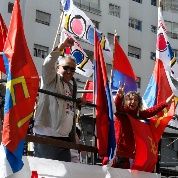The Broad Front was officially born on February 5, 1971 after a long history of failed attempts at establishing unity amongst left-wing forces in Uruguay throughout the twentieth century. The Broad Front was created as a response to the social and institutional problems plaguing the country; a product of a political system that alternated between two dominant parties, the National Party and the Colorado Party. The Broad Front emphasized maintaining a connection with the grassroots, focusing on social mobilizations and, not exclusively, on elections.

The driving force behind creation of the Broad Front is largely attributed to the trade union movement inside Uruguay. It was founded as a “big tent” coalition, with the participation of diverse groups such as the Communist Party and Christian Democrats. It contested elections for the first time in 1971, placing Liber Seregni as its candidate for president. Seregni was formally of the Colorado Party who made his name as a general in the Uruguayan armed forces. The Broad Front received slightly over 18 percent of the vote in those elections, which were criticized by the National Party as being fraudulent.
Notably absent from the Broad Front at its founding was the Tupamaros – National Liberation Movement, who since the 1960's had been waging a low-intensity guerrilla war against the Uruguayan ruling class. The Tupamaros, despite being in many ways inspired by the Cuban Revolution of 1959, concentrated their activities primarily in the urban centers of the country. Their organization grew in response to the increasingly authoritarian attitudes of the Colorado Party government. Their actions achieved great notoriety but their successes brought heavy repression from the state.
The Tupamaros were effectively defeated militarily by the end of 1972. Through its repression of the Tupamaros, the Uruguayan military gained confidence in its prominent place in Uruguayan society. This culminated in a coup d'état in June of 1973. The coup leaders dissolved the legislature, and The Broad Front was declared illegal. The civil-military dictatorship continued with its repression, targeting all progressive people, parties and organizations. Many members and activists of the Broad Front were imprisoned, tortured or killed by the civil-military dictatorship.
Democracy was restored in Uruguay and elections were held in November of 1984. The Broad Front's candidate in the 1971 elections was prevented from running, who had been imprisoned by the dictatorship from 1976 until March of 1984. Instead they ran Seregni's former running mate, Juan Jose Crottogini, who placed third. Seregni was the presidential candidate in the 1989 elections, once again placing third. That same year, 1989, also saw the former members of the Tupamaros re-founded themselves as the Movement of Popular Participation (MPP) and join the Broad Front. Over the years the MPP would grow to hold influential positions within the Broad Front.
Electoral success would not come for the Broad Front until 2004, when Tabare Vazquez of the Socialist Party, member of the Broad Front, won the elections after running as their candidate in the 1994 and 1999 elections. The victory of the Broad Front would be the first instance of the left-wing government in the history of Uruguay and one that would end the dominance of two party rule in the country.
The first government of the Broad Front implemented social reforms aimed at improving the situation of the poor and working class of Uruguay and worked to address social inequality, although many of the historic demands of the Broad Front were abandoned. The government also finally opened investigations into the abuses committed during the dictatorship.
The Broad Front's presidential victory was repeated in 2009. That election saw the arrival of Jose Mujica to the presidency. Mujica was a leader of the Tupamaros and was imprisoned for a total of 15 years for his activities. The MPP, led by Mujica and his wife Lucia Topolansky, has grown to become the dominant faction within the Broad Front.
Mujica's presidency continued with much of his predecessors progressive reforms. He also supported regional integration efforts and had close relations with the other progressive governments of the region. His government received widespread attention when it legalized the sale of marijuana. Mujica himself was the recipient of wide acclaim for his austere lifestyle, choosing to donate nearly all of his salary to charity and electing not to live in the Presidential palace.
Uruguay's constitution does not allow for successive re-election, as a result the Broad Front has chosen to run former president Tabare Vazquez in the upcoming elections on October 26.